Photographs and review by Indohyus, edited by Suspsy
Ornithomimids seem to be getting more and more popular in the realms of figures and collectibles. But of the great and diverse clade, it is surprising that Ornithomimus itself seems to be oddly absent, with few companies taking on the task of recreating this rather famous dinosaur. This is where Geoworld picked up the mantle, releasing it in their first series, and it will be the subject of this review.
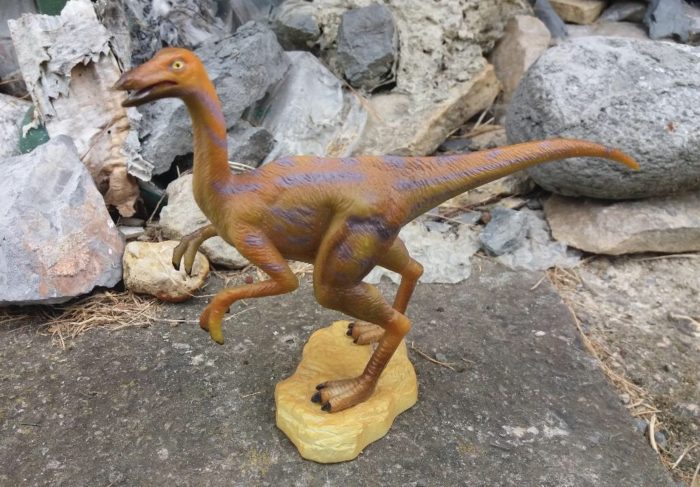
Those familiar with my previous Geoworld reviews will know I like to look over the fact cards packaged with every figure, as they are often a source for the company’s infamous plagiarism issues. While I haven’t found an exact match for the photo used, it does look like it was pulled out of an 80s’ or 90s’ children’s book. I wouldn’t be surprised if it was indeed plagiarised.
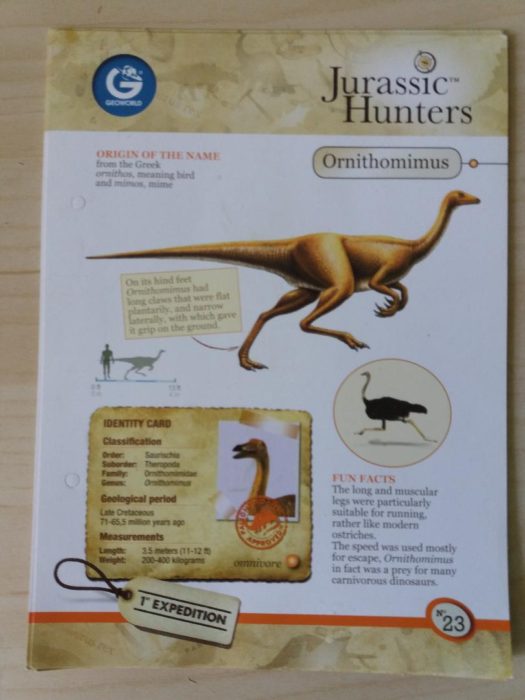
Well, I’ve put it off long enough. Let’s get to the figure itself. This Ornithomimus stands 4.4” high (4.9” with the rock base) and 6” long, rather large for certain lines to use with Cretaceous species, as it is scaled to 1:25 (consistency, consistency, my kingdom for consistency!). The paint is rather slapdash too. While the base colour works well enough, the stripes do not, as the purple is too dark and doesn’t stand out well enough, exposing the muddled placement of the spots and stripes. I know that nature is often chaotic in this manner, but even so, this is too chaotic. Weirder still is the random splodge of white paint under the tip of the tail. I don’t know if this is universal or just on mine, but it is bizarre. What’s worse is that it does seem similar to a picture I found online, making me suspect further plagiarism. The plastic itself is very cheap and tacky, which doesn’t help the figure at all, especially with the face.
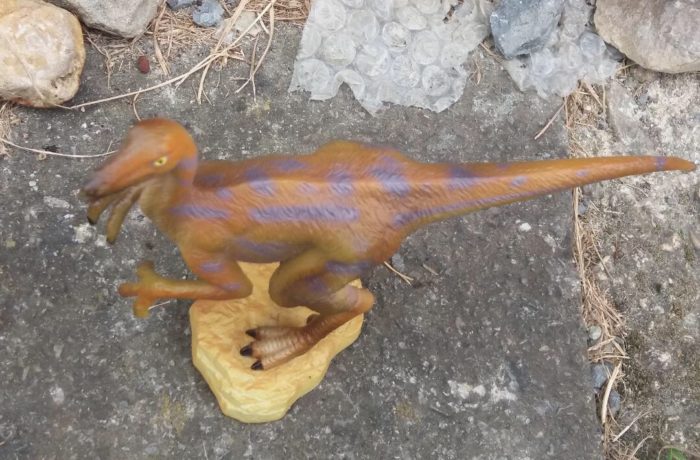
Now to accuracy. Let’s get the good stuff out of the way before going to another rant. It is, at least, a good body shape for Ornithomimus, representing the slender frame of the species, ideal for running at high velocity (hence the name, I suppose). The limb morphology is good, long but slender, and the tail and neck have decent lengths (tail could be longer, but oh well). They have even added feathers, however . . .
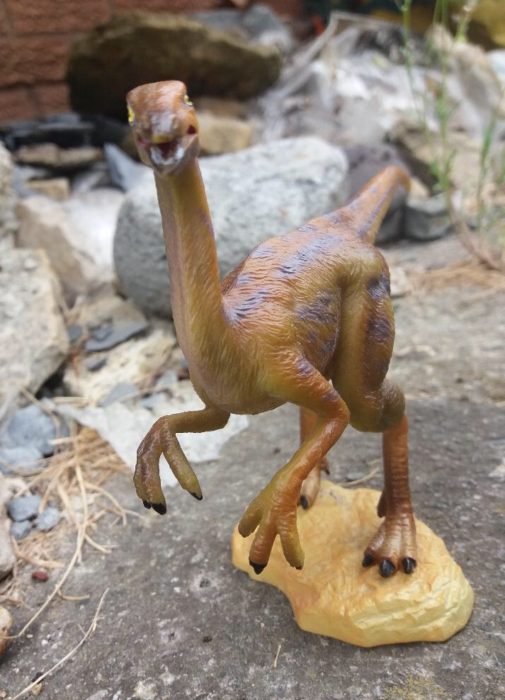
The execution of said feathers is atrocious! It’s so haphazard, it’s hard to tell whether they are feathers, scales, or wrinkles, thus making the figure seem further cheap. Then there’s the head. Aside from the cartoonish look, if you look in the mouth you will find pearly whites—when the species is known to be toothless! Moulded teeth as well, which makes it worse. And yes, the hands are pronated, despite this having been disproved for at least a decade.
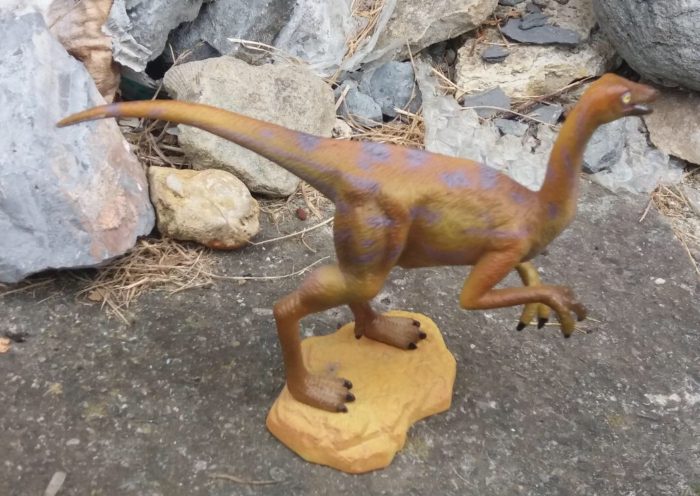
I really hope some more reputable companies take a crack at Ornithomimus, but this is what we have for affordable figures for now. Honestly, if you really want an Ornithomimus, I would recommend buying a similar ornithomimid and using that instead. This figure should be last case scenario only.
Disclaimer: links to Ebay and Amazon on the DinoToyBlog are affiliate links, so we make a small commission if you use them. Thanks for supporting us!



The figure having teeth is indeed an egregious inaccuracy, but it does also have another major inaccuracy: the dewclaws! Ornithomimids don’t have dewclaws, they only have three toes!
What many people think Ornithomimus is, is not necessarily what Ornithomimus actually is. North American ornithomimid taxonomy is currently a mess and it’s not clear which species and specimens should go in which genus e.g. Ornithomimus, Struthiomimus and Dromiceiomimus. As far as I’m aware the best North American ornithomimid specimens are ones which have not yet been classified reliably in a genus or sometimes even species. Perhaps the situation wouldn’t be quite as bad if a lot of the good specimens weren’t being referred to as “Ornithomimus edmontonicus”, which as Mickey Mortimer has written on The Theropod Database involves ignoring that the species “brevitertius” and “samueli” were both named before “edmontonicus” and thus have priority over it. As for what genus brevitertius and samueli belong in, I’m not sure there’s agreement.
What does this mean for Ornithomimus? Well, the good specimens that have been referred to Ornithomimus are not actually classified as the type species, Ornithomimus velox. The only thing Ornithomimus can be for sure is Ornithomimus velox, which is only known from very fragmentary remains. So if those better specimens are found to not be Ornithomimus, then Ornithomimus no longer has the identity of being a well-known ornithomimid.
I wouldn’t want to see another company make an Ornithomimus figure at present due to the uncertainty about what Ornithomimus is actually known from, and whether it’s even known from good remains. I’ve been hoping a company will make a good figure of Gallimimus though! The featherless versions, such as the Jurassic World toys are useless at representing Gallimimus as it was actually like.
I would really like to see someone sort out the mess in North American ornithomimid taxonomy. I’ve found the Theropod Database makes it much easier to understand (scroll down for Ornithomimidae): http://theropoddatabase.com/Phylogeny%20of%20Taxa.html
It is indeed a damned shame that this is the only Ornithomimus toy currently on the DTB. I don’t think CollectA will be doing one anytime soon, but hopefully Safari will!
One can only hope so. Deserves a better treatment.
CollectA did at least do a decent Struthiomimus, so there’s that for now.
Yeah, that’s why I’m doubtful that they’ll do an Ornithomimus any time soon, what with how similar it is to Struthiomimus. But who knows?
Takara Tomy (Learning Curve) has two Ornithomimus figures.